French house prices rebound!
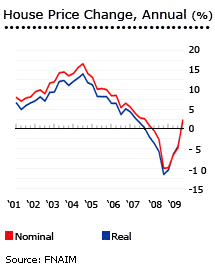
House prices in France rose 3.9% q-o-q in Q2 2009, after several quarters of price falls, according to the National Association of Real Estate Agents in France (FNAIM). France’s economic recovery has surprised market players and government officials, and is attributable to a fiscal boost, and to automatic stabilisers such as welfare support. When adjusted for inflation, the average house price rose by 2.97% over the same period. These quarterly price increases are the highest since Q2 2004.
Compared to a year earlier, average price of all dwellings was 6.6% down in nominal terms, and 6.4% down in real terms.
Most apartments or collective housing are located in urban areas. The relatively stronger performance of apartments seems likely to reflect the leading role of Paris:
- The average price of apartments (appartements) rose by 4.2% (3.6% in real terms) q-o-q to €2,972 per sq. m. in Q2 2009, after three consecutive quarterly price falls.
- The average price of detached houses (maisons) rose by 3.6% (3% in real terms) q-o-q to €2,055 per sq. m. in Q2 2009, after six quarters of price declines.
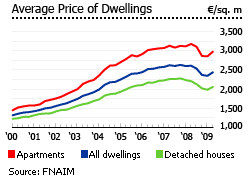
Low interest rates boosted house prices from 2001 to 2006. As price increases peaked in 2004.
When interest rates rose and lending conditions tightened, house price appreciation grounded to a halt in 2007.
France’s economy grew by only 0.3% in 2008, formally entering recession in Q3 2008. GDP was expected to contract by 3.3% in 2009. However GDP rose unexpectedly by a surprising 0.3% in Q2 2009, making France one of the first countries out of recession in Europe and the OECD.
France’s housing market is relatively less prone to sharp upturns and downturns due to its heavy reliance on fixed-rate mortgages. With interest rates back to their pre-crisis levels, modest house price increases are now expected.
A beautifully stable mortgage market
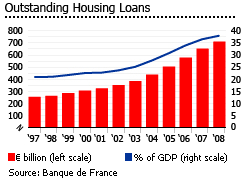
The structure of the French mortgage market contributes to the economy’s overall stability. Over 80% of all owner-occupied dwellings are mortgaged. More than 80% of housing loans are fixed-rate mortgages. Around 85% to 90% of new housing loans have an initial rate of fixation of more than one year. The reliance on fixed rate loans, combined with prudent lending behaviour, has greatly helped foster stability, a feature that Anglo-Saxon economies might do well to learn from.
France’s mortgage market is the third largest in the EU, after UK and Germany. Total outstanding housing loans rose by an average of 14% annually from 2004 to 2007. Despite the financial meltdown in 2008, the mortgage market grew by 8.7% in 2009 to €710 billion, up from €305 billion in 2000. During the past eight years mortgage lending has risen enormously, from 21% of GDP in 2000, to 37.5% of GDP in 2008.
While mortgage markets in many countries are at a standstill, France’s mortgage market continues to grow, albeit at a slower pace. New housing loans worth €86.8 billion were made during the year to end-Q2 2009, down from €132.6 billion during the year to end-Q2 2008.
Foreign buyers of second homes in France can still get “100% LTV euro loans, fixed at 4% (capped at +1/-1) for 25 years,” according to John Luke Busby of Athena Mortgages.
Mortgage interest rates down!
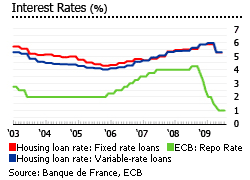
Interest rates for new housing loans eased after the European Central Bank (ECB) started to reduce key rates in September 2008.
The average rate on new housing loans with initial rate of fixation (IRF) of more than a year moved down to 4.33% in June 2009, from 5.19% in December 2008, while interest rate for loans with IRF of one year or less fell to 3.9%, from 5.38%, over the same period.
Many, many housing subsidies
Government subsidies are one reason for the resilience of France’s housing market. Housing subsidies amounted to €34 billion, or 2% of GDP, in 2008. About 40% of new housing in France receives some sort of subsidy.
From January to December 2009 the government boosted the housing market by expanding the coverage of subsidized zero-interest loans (the prêt à taux zero - PTZ loans). The amount of credit available is based upon the location of the house, number of family members and the length of loan maturity.
For instance, to qualify for a loan in “Zone A” areas, which includes major urban areas like Paris, individuals must have an income of less than €31,250. Households with 5 family members or more must have a combined income of €64,875 or less.
On new home purchases, the amount of PTZ credit granted is the smaller of the following two:
- 40% of the transaction amount in deprived urban areas or in urban zones, or 30% of transaction amount in other areas (up from 20%), or
- Or 100% of other loans (over 2 years) funding the same purchase.
PTZ loans can be combined with a special housing loan that enables modest-income households to buy their own home (prêt à l’ accession sociale – PAS loans). Households entitled to these loans should not have an income exceeding a certain limit, and the building cost must not exceed a certain threshold. Recipients of PAS loans benefit from lower interest rates and a housing grant to cover part of the monthly payment.
The government also runs a home ownership savings system, available to all, providing tax relief on interest earned in its special accounts.
The government also provides a grant for households taking out loans to buy property.
Rental market squeezed
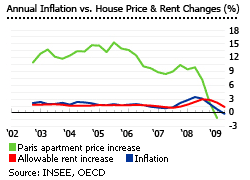
Initial rents are freely determined in France, but can be revised only once a year and not more than the (new) INSEE rental index. In certain periods, the allowable rent increase has been below inflation. The increases tend to not reflect changes in market conditions, especially in high demand areas such as Paris and other major cities.
From 2000 to 2008, apartment prices in Paris rose by 126% while the rent index rose by a mere 28% over the same period. This has led to relatively low yields. In July 2009, rental yields in central Paris ranged from 3.6% to 5.3%, according to the Global Property Guide. Smaller units earn higher yields.
Tenants in France have security of tenure:
- Unfurnished rental contracts have a minimum of three years term (if the proprietor is a person) or six years (if the proprietor is a company or society).
- Furnished tenancies have one year security.
Either way, the landlord can recover the property only if he intends to sell the property or live in it. Luckily, two-thirds of tenants occupy their dwellings for less than four years.
The private rental market comprises about 21% of the housing stock while 17% belongs to the social rental market. There is also a relatively large “other” category at 6%, including work-related residences. The social housing sector has a serious impact on the private rental market, especially as social sector rents declined from 1999 to 2001.
The owner-occupancy rate has slightly risen, from about 54% in 1996 to about 56% in 2002.
Foreign buyers
During the recent house price boom, there was a strong presence of foreign buyers in France’s South East.
According to the February 2008 property market review of Notaires de France and FNAIM, 64% of the buyers in Saint-Jean-Cap-Ferrat (Alpes Maritime) were from abroad, 46% in Ramatuelle (Var), 55% in Ville Franche-sur-Mer (Alpes Maritime), 58% in Chamonix (Haute-Savoie), 33% in Val-d’ Isère (Savoie), and 55% in Gets (Haute Savoie).
Outside the South East, around 20% of sales in the Dordogne and Creuse were to foreign buyers, 15% in the Gers and Charente, and 10% in many of the other areas of the West and South West.
Despite the recession in the UK, the British are still the largest buyers of French property, accounting for around 50% of all foreign buyers (down from 60%), according to data from Perval 2009 Notaires statistics.
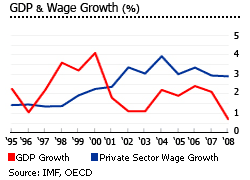
Rebound disguises France’s structural problems
Economic growth and house price increases in France tend to move together, but at significantly different paces. For instance, when house prices rose by an average of 7% annually from 2001 to 2007, the economy expanded by a mere 1.8% annually. In 2008, France’s GDP grew by 0.7%, while house prices fell by an average of 3%.
However house price rises are actually more strongly correlated with wage movements. Due to France’s adherence to its own brand of socialism from 2001 to 2007 private sector wages rose faster than GDP (wages rose by an average of 3.1% p.a.).
The downside is that the strength of French unions and lack of labour market flexibility has affected France’s competitiveness. France’s generous unemployment benefits have led to a structurally high unemployment rate, at 7.8% in 2008, through this is the lowest in more than two decades.
Despite the economic rebound, the unemployment rate is expected to exceed 10% by the end of 2009. Increases in social security spending are straining the government budget, already burdened by the fiscal expansion in late 2008. The deficit of the main social security scheme is expected to double to €20.1 billion by end-2009, and rise further in 2010. The budget deficit as a percent of GDP is expected to rise to around 8% in 2009, and 9% in 2010, up from 3.4% in 2008.
Given these constraints, it is clear that it would help if the French housing market was weaned off government subsidies.